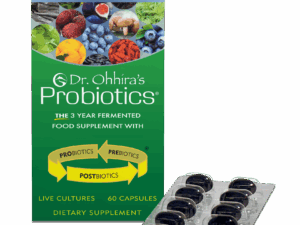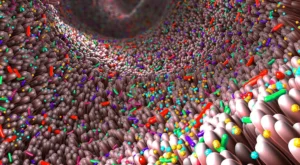Many people wisely take a daily probiotic supplement to maintain a healthy digestive system. The question is whether you can get the benefits of a probiotic dietary supplement by eating foods rich in probiotics instead? Also, what are the benefits of probiotic foods vs supplements? And do probiotic-rich fermented foods have greater benefits than probiotic dietary supplements? Keep reading; we answer those questions.
Benefits of Probiotic Supplements
A normal, healthy gut contains trillions of microorganisms (bacteria and yeasts), most of which are beneficial. When the balance of helpful to harmful microbes is disturbed (by diet, stress, antibiotic use, illness, aging, etc.), a probiotic supplement can help put you on the road back to better health. A high quality probiotic dietary supplement adds beneficial microorganisms to your digestive tract. These “good bacteria” counteract the harmful microorganisms, keeping them in check and allowing the digestive system to absorb the nutrients in food and boost the immune system.
The benefits of probiotic supplements are widely accepted. In general terms, a probiotic supplement adds helpful bacteria and yeasts back to the gut and promotes digestive health. Many people who suffer from digestive diseases, such as irritable bowel syndrome (IBS) and inflammatory bowel disease (IBD), find that probiotic supplements help alleviate their symptoms.
Those suffering from certain mental health issues, seasonal allergies, and skin conditions also report improvement after taking probiotic supplements. And many studies have shown that probiotic dietary supplements may help regulate weight; subjects in several weight loss studies who took supplements achieved far greater weight loss than those who received a placebo.
Benefits of Probiotic Rich Foods
Besides just adding beneficial microorganisms to the digestive system, foods rich in probiotics also offer many additional nutritional benefits. Fermented dairy products, such as Greek yogurt, cottage cheese, traditional buttermilk, kefir, and certain aged cheeses, contain protein, calcium, vitamin A, and iron, and are also a great source of probiotics. Fermented soybean products like tempeh, miso, and natto deliver a hefty dose of protein, fiber, and vitamin K. Likewise, sauerkraut, kimchi, and fermented pickles are high in fiber and nutrients in addition to being a good source of probiotics.
When weighing the benefits of fermented foods vs. supplements, first remember to not rely solely on foods to get enough probiotics. It may be difficult to get the variety of microorganisms in foods that you will receive with a probiotic dietary supplement. This is especially true if you are not a lover of the distinctive taste of fermented foods and, therefore, find it difficult to consume a wide variety of probiotic-rich foods each day.
Another drawback of obtaining your probiotics only from foods is that, in order to receive the benefits, the foods must contain live microorganisms. Storage and further processing, such as pasteurization, can kill the probiotics in fermented foods. As a result, ensure the products you choose are handled properly.
Also, if you are debating probiotic food vs supplements to address a specific health concern, you should know that specific strains of bacteria may be required to target your particular issues. Probiotic supplements allow the user more control over which microbial strains they ingest.
Which is Better for You?
Which side do you fall on in the fermented foods vs probiotic supplements debate? If you already eat many foods high in probiotics and consume a wide variety of food rich in probiotics each day, you may not need supplements. But if you want to target particular health concerns, or if you don’t love the taste of fermented foods or are concerned about proper storage and handling of probiotic-rich foods, then supplements are the way to go.
Some who debate the probiotics vs. fermented foods question have decided to take a probiotic dietary supplement daily while obtaining additional support from the probiotic-rich foods they enjoy.
Choose the best of both options!
If you are looking to add extra probiotics to your diet, check out Dr. Ohhira’s probiotic supplements for an extra daily boost for your immune and digestive health. Only Dr. Ohhira’s combines the best of both fermented probiotic-rich foods with the convenience and reliability of a probiotic supplement.
Plus, Dr. Ohhira’s Probiotics have the advantage of having critical postbiotics developed over their multiyear fermentation process. Why settle for anything but the best?
Dr. Ohhira’s Probiotics are produced in a unique, 3-year fermentation production process. Here’s how it’s done―a wide range of organically grown fiber-rich foods and 13 starter strains of probiotic bacteria are added to large fermentation vats. During the fermentation process, the probiotic bacteria converts the food fibers into a wide range of postbiotic metabolites. After 3 years, Dr. Ohhira’s Probiotics contain live probiotic bacteria, prebiotics, and over 500 bioactive, health-promoting postbiotic metabolites.
The award-winning Original Formula and Professional Formula begin with vegetable extracts, mushrooms, selected herbs, super fruits and seaweeds―all are naturally fermented with live probiotic strains for three to five years. Finally, the full matrix of the prebiotic foods, probiotic strains, and postbiotic nutrients are all encapsulated together, ensuring superior digestive and immune support. They are hand-made in Japan with a true respect of nature and a reverence for science.
You deserve the best. You deserve Dr. Ohhira’s Probiotics from Essential Formulas. Discover the Dr. Ohhira’s Advantage for today!






